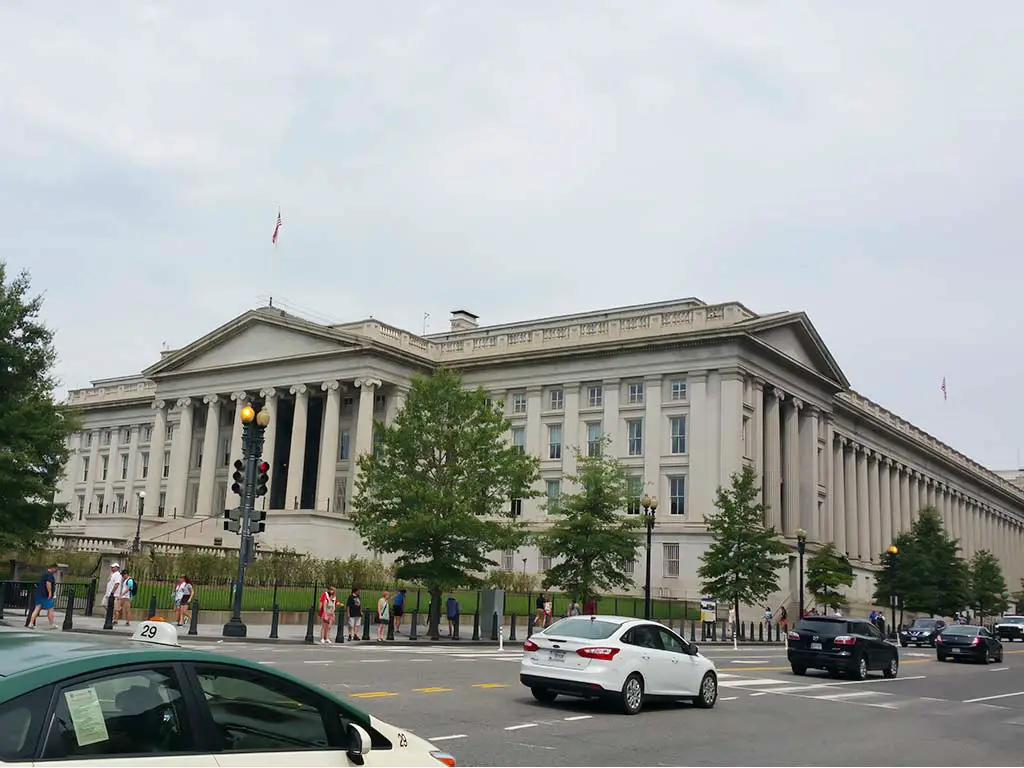Curious about the inner workings of American finance and governance? Wondering what lies behind the imposing columns of the Treasury Building in Washington, D.C.?
Treasury tours offer an illuminating journey through the heart of economic policy and history. From the production of currency to the formulation of financial regulations, the U.S. Treasury plays a pivotal role in shaping the nation’s economy.
In this blog post, we’ll delve into the intricacies of Treasury tours in Washington, D.C., exploring key attractions, tour tips, and the rich historical significance of this iconic institution.
Whether you’re a history buff, a financial enthusiast, or simply curious about government operations, join us as we uncover the fascinating world of Treasury tours and know American financial governance. Stay focused.
A Brief History of the Treasury in Washington DC

The United States Treasury, located in Washington, D.C., has a rich history dating back to its establishment in 1789. Originally housed in Philadelphia, it moved to its current location in 1800 when D.C. became the nation’s capital.
Throughout its history, the Treasury has played a pivotal role in managing the country’s finances, including issuing currency, collecting taxes, and managing the public debt.
One of its most iconic features is the Treasury Building, completed in 1869, which houses various offices and departments responsible for economic policy and financial management.
Over the years, the Treasury has weathered numerous economic challenges, including the Great Depression and financial crises, while adapting to changes in financial markets and government priorities.
Today, it remains a cornerstone of the U.S. government’s fiscal operations, overseeing critical functions essential to the nation’s economic stability and prosperity.
Planning for A Treasury Tour in Washington DC

Planning a Treasury tour in Washington, D.C. promises a fascinating journey through American financial history, offering visitors insight into the nation’s economic infrastructure and the role of the Treasury Department in shaping it.
Here’s an elaborate guide to crafting your Treasury tour itinerary:
Historic Significance
Begin your tour by delving into the historic significance of the U.S. Treasury. Established in 1789 by the first Congress, the Treasury Department is one of the oldest federal agencies, responsible for managing the nation’s finances.
Its roots trace back to Alexander Hamilton’s vision of a strong central financial authority, crucial for the young republic’s stability and growth.
Treasury Building
Explore the iconic Treasury Building, a majestic structure completed in 1869. Situated at 1500 Pennsylvania Avenue NW, it is a National Historic Landmark and home to various Treasury offices.
Admire its neoclassical architecture, featuring impressive columns and intricate details, while appreciating its role as a symbol of American financial strength.
Guided Tours
Take advantage of guided tours offered by the Treasury Department, providing visitors with in-depth insights into its operations and historical significance.
Knowledgeable guides offer fascinating anecdotes and behind-the-scenes perspectives, enhancing the tour experience.
Currency and Mint
Learn about the production of currency and coins at the Bureau of Engraving and Printing and the United States Mint, both under the Treasury Department’s purview.
Witness the intricate process of currency printing and coin minting, gaining an appreciation for the craftsmanship and technology involved in producing money.
Financial Policy
Gain a deeper understanding of the Treasury Department’s role in formulating and implementing financial policies that shape the nation’s economy.
Explore its efforts in managing public debt, regulating financial institutions, and fostering economic stability through monetary and fiscal measures.
Historical Exhibits
Engage with historical exhibits showcasing artifacts, documents, and interactive displays highlighting pivotal moments in American financial history.
From the issuance of the first federal currency to landmark economic reforms, these exhibits offer a glimpse into the Treasury’s evolution and its impact on the nation’s prosperity.
Legacy of Secretaries
Explore the legacy of past Treasury Secretaries who have left indelible marks on U.S. economic policy and financial management.
From Alexander Hamilton’s foundational contributions to Henry Morgenthau Jr.’s stewardship during the Great Depression, each Secretary’s tenure reflects unique challenges and achievements in guiding the nation’s fiscal course.
Security Features
Gain insight into the Treasury Department’s efforts to combat counterfeiting and ensure the integrity of U.S. currency.
Learn about the intricate security features incorporated into banknotes and coins to deter counterfeiters and safeguard the public’s trust in the monetary system.
Planning your Treasury tour allows you to delve into the heart of American financial governance, tracing its evolution from the nation’s founding to the present day.
Whether you’re a history enthusiast, an economics aficionado, or simply curious about the inner workings of the U.S. Treasury, this tour offers a captivating journey through the corridors of power and finance.
How to Accomplish A Treasury Tour Washington DC Successfully

Embarking on a Treasury tour in Washington, D.C. offers a unique opportunity to immerse yourself in the history and operations of one of the nation’s most vital institutions.
To ensure a successful and fulfilling experience, consider the following strategies:
Preparation and Planning
Before your visit, conduct thorough research to familiarize yourself with the Treasury’s history, significance, and notable attractions.
Explore the Treasury Department’s official website for tour information, hours of operation, and any special guidelines or requirements.
Additionally, consider booking tickets or arranging for guided tours in advance to secure your spot and optimize your time.
Arrival and Security Procedures
Upon arrival at the Treasury Building, be prepared to undergo security screening similar to airport procedures. Arrive early to allow ample time for security checks and registration if required.
Remember to carry valid identification and adhere to all security protocols to facilitate a smooth entry into the premises.
Guided Tours and Interpretive Services
Take advantage of guided tours offered by the Treasury Department, led by knowledgeable guides well-versed in the institution’s history and operations.
These tours provide valuable insights and context, enhancing your understanding and appreciation of the Treasury’s significance.
Alternatively, consider utilizing interpretive services such as audio guides or informational pamphlets to navigate the exhibits independently while still gaining valuable information.
Focus Areas and Key Attractions
Tailor your itinerary to focus on specific areas of interest within the Treasury Department.
Explore key attractions such as the historic Treasury Building, the Bureau of Engraving and Printing, and the United States Mint, where currency and coins are produced.
Delve into exhibits highlighting the Treasury’s role in financial policy, currency design, and economic governance, allowing you to deepen your understanding of these critical functions.
Engagement and Interaction
Actively engage with exhibits, displays, and interactive features to maximize your learning experience. Ask questions, participate in demonstrations, and interact with museum staff to gain additional insights and perspectives.
Take advantage of opportunities to handle replica currency, examine security features, and learn about the intricacies of monetary production and regulation firsthand.
Documentation and Reflection
Capture memorable moments and insights through photography, note-taking, or journaling to document your Treasury tour experience.
Reflect on key takeaways, observations, and discoveries, considering how they relate to broader themes in American history, economics, and governance.
Share your reflections with fellow visitors or on social media platforms to extend the impact of your experience beyond the tour itself.
Post-Tour Exploration and Enrichment
After completing your Treasury tour, consider further exploration of related sites and attractions in Washington, D.C.
Visit nearby landmarks such as the White House, the National Mall, or other museums and monuments dedicated to American history and government.
Take advantage of educational resources, books, and online materials to deepen your knowledge and understanding of topics covered during the tour.
By following these strategies, you can accomplish a Treasury tour in Washington, D.C. successfully, maximizing your learning, engagement, and enjoyment along the way.
Whether you’re a history buff, a financial enthusiast, or simply curious about the inner workings of government, this tour offers a rewarding and enriching experience that resonates long after your visit.
Tips for A Treasury Tour Washington DC

Embarking on a Treasury tour in Washington, D.C. presents a unique opportunity to delve into the heart of American financial governance and history.
To make the most of your visit, consider the following tips, organized by numbers:
1. Plan Ahead
Start by researching the Treasury Department’s official website for tour information, hours of operation, and any special requirements or restrictions.
Consider booking tickets or reserving spots on guided tours in advance to avoid disappointment, especially during peak tourist seasons.
2. Arrive Early
Beat the crowds by arriving at the Treasury Building well before your scheduled tour time.
Arriving early not only allows you to navigate security procedures more smoothly but also provides time to explore the surrounding area and take in the architectural beauty of the building.
3. Prepare for Security Screening
Be prepared to undergo security screening upon entry to the Treasury Building, similar to airport procedures.
To expedite the process, ensure that you have valid identification readily accessible and follow all instructions given by security personnel.
4. Opt for Guided Tours
Take advantage of guided tours offered by the Treasury Department, led by knowledgeable guides who provide valuable insights into the institution’s history, significance, and operations.
Guided tours offer a structured and informative experience, allowing you to make the most of your visit.
5. Focus on Key Attractions
Prioritize your time by focusing on key attractions within the Treasury Department, such as the historic Treasury Building, the Bureau of Engraving and Printing, and the United States Mint.
These attractions offer unique insights into the production of currency and coins, as well as the Treasury’s role in financial policy and regulation.
6. Engage with Exhibits
Actively engage with exhibits, displays, and interactive features throughout your tour to enhance your learning experience.
Ask questions, participate in demonstrations, and interact with museum staff to gain additional insights and perspectives.
7. Learn About Currency Production
Take the opportunity to learn about the production of currency and coins at the Bureau of Engraving and Printing and the United States Mint, both of which fall under the Treasury Department’s purview.
Gain insight into the intricate processes involved in currency printing and coin minting, as well as the security features designed to deter counterfeiting.
8. Understand Financial Policy
Deepen your understanding of the Treasury Department’s role in formulating and implementing financial policies that shape the nation’s economy.
Explore exhibits and displays highlighting key moments in American financial history, from the issuance of the first federal currency to landmark economic reforms.
9. Capture Memories
Document your Treasury tour experience through photography, note-taking, or journaling to preserve memories and insights gained during your visit.
Reflect on key takeaways and observations, considering how they relate to broader themes in American history, economics, and governance.
10. Extend Your Visit
Consider extending your visit to explore related sites and attractions in Washington, D.C., such as the White House, the National Mall, or other museums and monuments dedicated to American history and government.
Take advantage of educational resources and online materials to further enrich your understanding of topics covered during the tour.
By following these tips, you can maximize your enjoyment and learning during a Treasury tour in Washington, D.C., creating lasting memories and insights that deepen your appreciation for American financial history and governance.
Wrapping Up
A Treasury tour in Washington, D.C. offers an enriching journey through the corridors of American financial history and governance.
By planning ahead, arriving early, and engaging with guided tours and key attractions, visitors can gain valuable insights into the Treasury Department’s role in shaping the nation’s economy.
Exploring exhibits on currency production, financial policy, and historical milestones enhances understanding and appreciation for this vital institution.
Capturing memories through documentation and extending the visit to other nearby landmarks further enriches the experience.
Whether you’re a history enthusiast, a financial buff, or simply curious about government operations, a Treasury tour provides a fascinating glimpse into the inner workings of American governance.
Also, it leaves you with a deeper understanding of its economic infrastructure and legacy. Best wishes.




Scott Jung